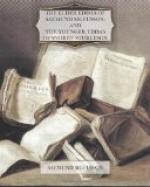15. Loud will laugh Hunding’s sons, they who Eylimi of life deprived, if the prince is more desirous to seek red rings, than to avenge his father.
King Hialprek collected a fleet to enable Sigurd to avenge his father. They encountered a great storm, and were driven past a certain promontory. A man was standing on the cliff who said:
16. Who ride yonder, on Raevils horses, the towering billows, the roaring main: the sail-steeds are with sweat bedewed, the wave-coursers will not the wind withstand.
Regin.
17. Here am I and Sigurd in sea-trees; a fair wind is given us for death itself: higher than our prows the steep waves dash, the rolling horses plunge. Who is it that inquires?
Hnikar.
18. They called me Hnikar, when I Hugin gladdened, young Volsung! and battles fought. Now they mayest call me the ancient of the rock, Feng, or Fiolnir.—I desire a passage.
They turn to the land, the old man goes on board, and the storm abates. Sigurd said:
19. Tell me, Hnikar! since thou knowest the omens both of gods and men, which omens are the best—if to fight ’tis needful—at the swing of glaves?
Hnikar.
20. Good omens there are many, if men but knew them, at the swing of glaves, a faithful fellowship, I think, is the dark raven’s, with the sworded warrior.
21. The second is, if, when thou art gone out, and about to depart, thou seest two renown-seeking men standing in the fore-court.
22. The third omen is, if wolves thou hearest howl under the ash-boughs, it will victory to thee announce over helmed warriors, if thou seest them go before thee.
23. No man should fight against the moon’s late-shining sister. They have victory, who can see keenly at the play of swords, or to form the wedge-array.
24. Most perilous it is, if with thy foot thou strikest, when thou to battle goest. Wily Disir stand on either side of thee, and wish to see thee wounded.
25. Combed and washed let every brave man be, and at morning fed; for ’tis uncertain whither he at eve may come. ’Tis bad to succumb to fate.
Sigurd fought a great battle with Lyngvi, Hunding’s son, and his brothers, in which Lyngvi and his three brothers fell. After the battle Regin said:
26. Now is the bloody eagle, with the trenchant blade, graven on the back of Sigmund’s slayer. No son of king, who the earth reddens, and the raven gladdens, is more excellent.
Sigurd returned home to Hialprek, when Regin instigated him to slay Fafnir.
FOOTNOTES:
[Footnote 59: One of many periphrases for gold.]
[Footnote 60: To wit, to avenge my death on your brothers.]
[Footnote 61: Sigurd.]
[Footnote 62: A terrific helm or headpiece.]




